| RESIN-TOPPED COUNTERS AND OTHER RIGID SURFACES |
 |
|
Looking for a unique, modern, and beautiful way to invigorate your kitchen, bathroom, or restaurant establishment? Having your counter top or table resin-coated is the perfect option. Affordable, customizable, and with a stunning finish, you'll be left with a strong, durable, high-shine center piece that will last for years.
This article explores different ways to personalize your own countertops with resin.
|
SUMMARY
| WHAT IS RESIN |
OUR RESIN SERVICE |
USES FOR RESIN |
ACCENTS |
| Epoxy resin is mixed with a hardener to create a crystal clear, highly durable surface as strong as 50 coats of varnish. |
At KeenART Media, we offer resin-coating surfaces for countertops, tables, chair seats, and more. |
Resin is a great coating for kitchen, bathroom, and restaurant surfaces, in addition to countless other applications. |
Three dimensional objects like stones and shells, or two dimensional items such as photographs can be displayed beneath the resin. |
|
| WHAT IS RESIN?
|
 |
|
Epoxy Resin, known chemically as polyepoxides, are reactive prepolymers and polymers that can be mixed to react with themselves, or with many other reactants such as alcohols, phenols, and acids. These co-reactants are referred to as hardeners because they cause the epoxy to solidify, or cure.
Depending on the reactants, epoxy resins can have a wide range of properties, from fast to slow curing, opaque or clear color, water-proof or just water-resistant, and flexible or rigid. As such, resin is used in for many different applications.
In addition to artistic uses, epoxy resins can be used for many different purposes including adhesives, electronics, aerospace products, and home appliances and furniture.
Resin Thickness
On flat, rigid surfaces such as countertops, resin is applied in layers approximately 1/16" thick. Depending on the desired result and depth of the surface (uniform, or with varying levels - bumpy), mutiple layers may be required.
Caring for Resin
Once cured or hardened, resin is extremely easy to care for. It's very difficult to scratch or chip, so you don't have to worry about the cloth. It's largely resistant to heat, so you can scrub away dried on messes with hot water, and it won't be damaged by alcohol or acids.
To learn more about resin in general, check out our Epoxy Resin Coating article.
|
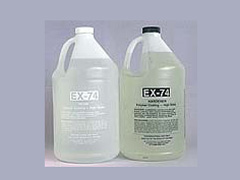
|
| KEENART MEDIA'S RESIN SERVICE
|
 |
|
We're happy to announce we are now offering custom resin coatings on all your rigid surfaces.
Available to our customers in the Greater Vancouver Area: if you can detach it and bring it, we can put resin on it!
Pricing:
A custom price will be determined for your project, based on the size of the item, the number of resin layers required, and whether or not you supply the items to be placed below the resin.
A base rate of $60/hour will apply. Extra large panels, multiple layers, and decorative items may be subject to an additional fee.
Please contact us for more information on this exciting new service!
Read on to find out more about how resin can be used to beautify the surfaces of your home or business.
|
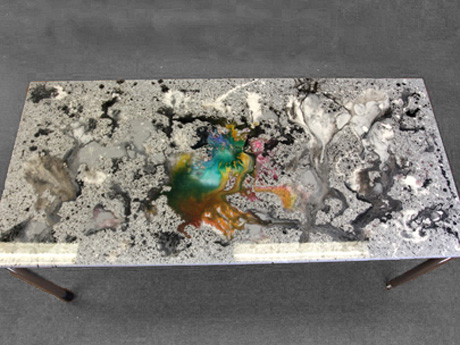
Our paint-marbled resin tabletop
|
| RESIN FOR HOME DECOR
|
 |
|
Resin has become a popular surface coating for counter and table tops in residential homes and commercial establishments. Because the resin is transparent, the wood grain or other material is still visible, but is preserved and protected against scratches, burns, stains, water marks and other damages that befall well-used surfaces.
Once it has hardened, the resin is extremely durable. It resists melting if heat is applied, is difficult to scratch - it's as hard as fifty layers of varnish. It's also UV-resistant. Not only does it remain crystal clear, it adds a high shine and an almost three-dimensional effect that saturates the colors below it.
As long as the surface can be laid flat for coating, there are not many limits to what can be resined:
- Bathroom countertops
- Kitchen countertops
- Dining tables
- Wood or plastic chair seats
- Coffee and end tables
- Desk tops
- Kitchen islands
- So much more!
Resin can also be poured onto a wide range of surfaces. They must have a coating to prevent the resin from being absorbed, but if this is not naturally in place, a protective layer can be applied prior to the resin application. Use resin to enhance your:
- Granite
- Concrete
- Tile
- Stone mosaic
- Copper
- Wood
- Painted
- Glass
- Metal
- Marble
But simply pouring resin onto your existing surface isn't the only way to use it. Since the resin creates a seal once hardened, you can place almost anything on the surface before you pour on the resin. Check out these great ideas, below.
|
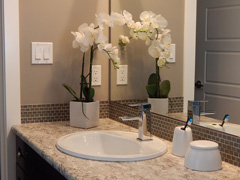
Resin will protect your bathroom counter from heated items.
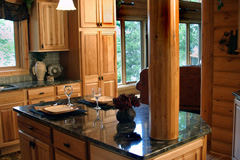
Resin is non-toxic and easy to clean
|
| DECORATING/ACCENTING THE COUNTERTOP
|
 |
|
If you want a new look for your countertop, and really don't want the resin to enhance the old, scuffed, chipped, or otherwise unsightly original surface, there are plenty of options available to you.
Whether you completely replace the surface with something new and unique, or just add updated touches to your existing surface, your imagination is really the only limit to what you can create:
- THREE DIMENSIONAL OBJECTS
- Crushed glass. Any color, any size. The glass can be scattered on the surface or laid out in a mosaic-style pattern. Paint the surface any color before laying the glass, for a bold, refractive tabletop. The resin will only enhance the reflective qualities of the material.
- Bottle caps. A great option for your basement bar, or the bartop in a lounge or restaurant. The caps can be scattered, or placed in neat rows. A few layers of resin are required to fully cover the caps.
- Coins. Pennies, foreign currency, even non-monetary coins can be covered with resin for a shiny, metal look with a peak of color, white, or black visible between the coins.
- Crystals. Probably faux, unless you have a large budget. Crystals overlaid with resin will sparkle, shine, and refract the light in a unique way.
- Shells or sea glass. For a beachy or nautical room, consider a layer of seashells - crushed for an iridescent shimmer, or whole - or multi-colored sea glass in keeping with the theme.
- Lego. Perfect for the kids' bathroom, or an architect's kitchen, the lego can be stacked and laid on its side or placed right side up to show the classic top bumps. Choose specific colors or use the full rainbow.
- Rounds of wood. For a rustic look without the slabs, thin cross-cuts of branches can be laid out across the surface. The surface color will be visible between the items.
- Leaves, flowers, other flora. Autumn leaves, spring buds, seaweed, or other plant life can make your kitchen feel like your favorite season all year long. Resin has an amber-like effect, so the items will stay just as they were when they were coated.
- Coffee beans or grains. A scattered or dense layer of coffee beans is perfect for a coffee shop bar counter or even the customer tables. Wheat grains for an Italian pasta restaurant. Barley for a bar that brews its own beer!
- TWO DIMENSIONAL OBJECTS
- Add light. If you mount the resin and whatever added decor on a transparent sheet of acrylic, you can place lights under the counter for a glowing effect. Ideal for the bathroom, this style also works for kitchen countertops, or islands with an electricity hookup.
|
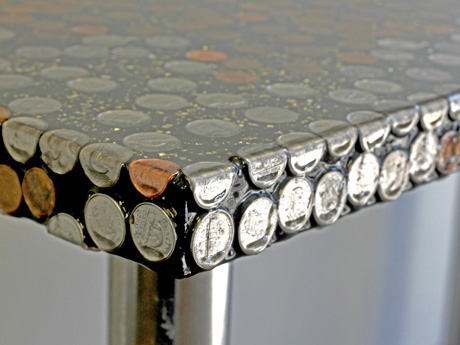
Coin table detail
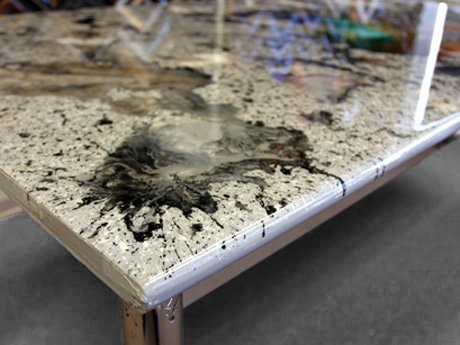
Swirled paint table detail
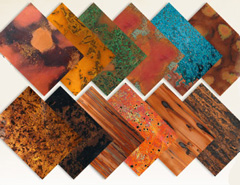
Copper sheets can be laid and resin applied on top
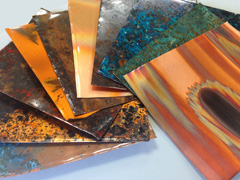
Copper sheets come in a wide variety of styles
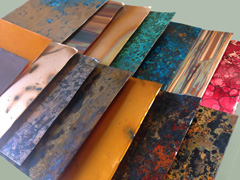
With resin, the copper is given a high shine
|
| RESIN FOR ARTWORK
|
 |
|
At KeenART Media, we can coat your rigid-mounted or canvas prints with resin!
Resin on artistic displays results in an eye-catching, high gloss surface that adds vividness to color and depth and dimension to grayscale images, while protecting the product from scratching, scuffing, and environmental damages.
Though similar to a glass or plexiglass cover over a flat artwork, because the resin is adhered directly to the image, an almost three dimensional effect is achieved due to the way the light is forced to reflect and refract off the surface. UV resistance means your print will not fade, and the resin will not yellow or degrade over time. Nonetheless, we suggest your print be kept indoors and out of direct sunlight to keep it beautiful for as long as possible.
Prints and original artwork can be coated in resin, though it is important to keep in mind that this application is permanent and removal will damage the image. Resin will adhere, diamond-hard and with high clarity, to wood, acrylic and watercolor paints, paper prints, canvas, and most three dimensional objects. Wax paper and soft media, like pastels and charcoal, to not work well with resin coatings. (If you have an original in one of these mediums, you can always choose resin coating for the print!)
- RESIN ON CANVAS
You can choose to have your gallery wrapped canvas print coated with resin. This process will eliminate the delicate flexibility of the canvas and provide a reflective sheen that protects the image. The bold colors in the print will pop and the viewer will feel as though they are really there, seeing the original scene.
- RESIN ON DI BOND
Aluminium Di Bond is a rigid surface made from two pieces of pure aluminium with a polyethylene core. Any printed image can be dry mounted onto this thin surface and displayed on the wall with an invisible float hanger. Similarly, your image can be mounted on Gatorboard, foam board, or Sinta prior to being coated with resin.
- RESIN ON WOOD
Your paper print can be mounted on a wood panel, which offers the depth of a canvas print, with the natural touch of a bare, wood grain drop edge. The result is a unique combination of contemporary and rustic, with the sharp, frameless image surrounded by the soft tones of the wood.
- RESIN ON 3D OBJECTS
Resin can be applied to collages, relief carvings or found object displays, and many in-the-round carvings or constructions. Depending on the number of resin layers and the depth of the object, resin can be applied to make objects appear to be floating within the sculpture, or simply add high gloss shine and a protective coating on the entire project.
For more information, see the "Resin at KeenART Media" section of our Epoxy Resin Coating article.
|
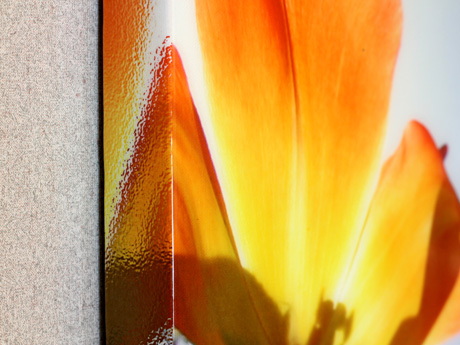
Detail of a resin-coated canvas print
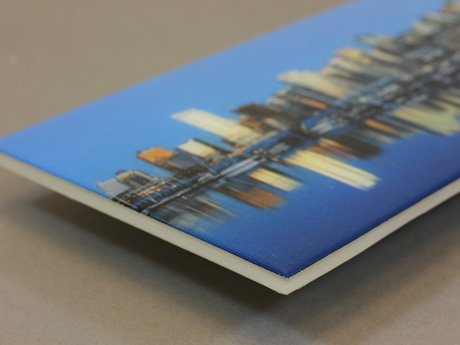
Detail of resin-coated photo on foam board
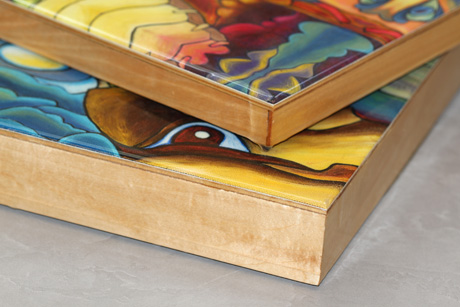
Detail of resin-coated photo on wood panel
|
|
Resin is a wonderful option for brightening up a drab old countertop or table. For some wonderful inspiration, check out our Resin Surfaces Pinterest page.
If you have questions about any of our services or products, don't hesitate to contact us. Our knowledgeable staff is always happy to assist with answers, advice, or suggestions.
|
| Resin Coating FAQs: |
 |
Q1 : What is epoxy resin?
Resin results in a THICK, glossy, clear & shiny coat atop the artwork. A fluid-like coating is mixed with a hardener in order to create the strong bonding agent. After it has been mixed, it is poured onto the artwork. This thermosetting polymer is a viscose fluid that is very tough and rigid after it has been cured, making it heat-, scratch- and water-resistant. It results in an ultra glossy appearance that can make your canvas prints stand out.
Because of its durability, it is mainly used as structural or engineering adhesive for boats, automobiles, air crafts, flooring, dentistry, etc. It is also used as strong adhesive, coating and laminate.
Learn more from our Resin Coating article.
Order online: Epoxy Resin
Q2 : What is the difference between a resin coating and a varnish?
A resin coating is like varnish, but since it is much thicker, it acts like an extra protective coating for your artwork, prints or canvases. The cured resin will be heat, water and scratch resistant and it dries very glossy to achieve a translucent effect. Varnishes are also used to protect artwork, but aren't as durable as the thick resin coating.
Q3 : What can you apply epoxy resin on?
Epoxy resin on most types of material. We can add a resin coating to any of your canvas prints, original oil and acrylic paintings, posters, photographs and plaque mounts! This coating is very versatile and can be used in many ways. The coating is rigid and strong when it is dry, so it will maintain a great finish on all your photos, images and artwork!
Order online to do-it-yourself: Epoxy Resin
Q4 : What is the recommended amount of resin coating for my photo?
We recommend a 1/8" coating of resin which is two layers of 1/16" because it is the best amount of coating to enhance the image quality and protect the artwork. But there is no limit to how much resin you should apply; please contact us if you are unsure of how much resin your prints require.
Q5 : What is the difference between Polyester Resin and Epoxy Resin?
Polyester resin, although it has adhesive qualities, does not bond as well as epoxy resin. Polyester resin is made to be a laminating resin, usually for fibreglass or in molds. Unlike epoxy resins, polyester resins require a catalyst instead of a hardener - they have a low shelf life because they gel on their own. Polyester resin sets much faster and is less expensive than epoxy resins, but epoxy resins are more durable, more waterproof, better bonding agents, and will last much longer, so they are better for coating artwork.
We sell and use Epoxy Resin
Q6 : What brand of Resin do you use?
We use EX-74 which is an extremely clear, tough, high gloss surface coating formulated to produce a deep glass-like appearance in a single layer on a sealed surface. EX-74 has been formulated for improved UV resistance, which means it reduces yellowing and surface degradation from UV exposure. EX-74 has an extended "open time" which allows up to 25 minutes in the mixing container at 70º F and up to one hour working time on the surface being coated. It is not recommended in freezing climates due to possibility of de-lamination. EX-74 resists yellowing from UV exposure, but it is not weather-resistant and is not recommended for unprotected exterior use.
Order online: EX-74 Resin
Q7 : Will all epoxy resins will eventually yellow over time?
So Yes — all epoxy resins will eventually yellow over time, no matter the brand.
Here’s why:
Causes of Yellowing
UV light exposure – Sunlight is the main factor that breaks down resin over time.
Oxidation – Even in storage, resins can slowly discolor due to air exposure.
Heat – High temperatures speed up the process.
How Long Before Yellowing Shows
Premium brands like ArtResin or EX-74 are formulated with UV stabilizers and tend to stay clear for several years before noticeable changes.
Cheaper resins may yellow much faster (sometimes within months).
What You Can Do
Keep resin artwork out of direct sunlight.
Use UV-protective coatings or sprays.
Choose high-quality resins (like the ones you mentioned) for slower yellowing.
So yes, they do get yellowish after years, but good resins will stay clear longer.
Q8 : Will the resin coating affect my photo?
The epoxy resin will not harm your image in any way, though it is permanent and cannot be removed without damaging the print. The viscosity of the polymer will sit on top of the canvas and act like a seal, actually protecting your print for water damage or scratched. The glossy shine of hardened resin will enhance the colors within your image by brightening them up.
Q9 : What images are best for a resin application?
Resin is a good agent for coating and protecting your artwork or photos, and will enhance the colors of the photo or the artwork because of the way it reflects and retracts light. In general, artworks with texture, or canvas gallery wrap prints, are better, compared to flat-mounted photographs.
Q10 : How long does a resin coated image last?
The resin we use dries very tough and rigid, so it is highly durable, resistant against heat and water, and insoluble in alcohol. This extra durability protect your photos. This formula has improved UV resistance and minimizes surface degradation from UV exposure. Resin is used for many industrial purposes, but in order to maintain its longevity, it is best to keep indoors, out of direct sunlight.
Q11 : Does a resin-coated picture yellow over time?
Our resin has been enhanced to protect against yellowing from UV exposure; if kept indoors and out of direct sunlight it will last for many years.
Q12 : What are the advantages of epoxy resin?
The resin will seal your canvases and protect them from moisture, heat and physical stress. Most epoxies are used as industrial grade adhesives because of their durability and rigidness, therefore epoxy resin will protect your canvas for a very long time. The epoxy has a high gloss finish that gives your canvas a glassy look. This feature can enhance the colors within the image.
Order online: Epoxy Resin, unmixed for DIY projects.
Q13 : What are the disadvantages of epoxy resin?
The resin can yellow if exposed to excessive sunlight. Our resin has been improved to resist yellowing from UV light and if kept out of direct sunlight the yellowing will be reduced. It also is prone to trapping air bubbles or dust. These bubbles usually appear after it has dried and settled. This is very common with resin coating because of its viscous nature. We cannot always guarantee a flawless finish but we always try our best to reduce the amount of interference from environmental elements.
Q14 : How do I clean my resin print?
You can clean it with a damp cloth.
Q15 : What is the turnover time, if I want to get my prints finished with epoxy resin?
Epoxy resin takes at least 24 hours to cure, so expect an extra day to two days delay on your orders if you request resin coating on your prints.
|
|
| If you don't find the answer you're looking for here, please contact us. |
|
© 2002-2026 - KeenART Media Ltd.
|
|
| |
|
